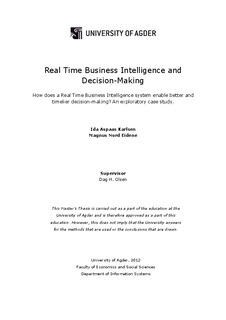Real time business intelligence and decision-making : how does a real time business intelligence system enable better and timelier decision-making? An exploratory case study.
Master thesis
Permanent lenke
http://hdl.handle.net/11250/136147Utgivelsesdato
2012Metadata
Vis full innførselSamlinger
Sammendrag
Today’s
businesses
need
support
when
making
decisions.
Business
intelligence
(BI)
helps
businesses
to
make
decisions
based
on
good
pre--‐analysis
and
documented
data,
and
enables
information
to
be
presented
when
and
where
the
decisions
need
to
be
made.
Real
time
business
intelligence
(RTBI)
presents
numbers
in
real
time,
providing
the
decision
makers
at
the
operational
and
tactical
layers
with
data
as
fresh
as
it
can
be.
Little
research
has
previously
been
done
on
how
a
real
time
business
intelligence
solution
can
benefit
an
organization
in
means
of
changing
current
decision
processes.
This
thesis
aims
to
show
why
there
is
a
need
for
a
real
time
business
intelligence
solution
and
how
that
can
change
the
current
decision
processes
and
make
them
more
efficient.
Further
it
indicates
that
there
are
challenges
to
the
current
decision
processes
that
need
to
be
addressed.
This
study
has
been
conducted
as
a
qualitative
exploratory
case
study
in
the
Byggma
group,
with
16
face--‐to--‐face
interviews
at
the
three
plants
of
Huntonit
AS,
Fibo--‐Trespo
AS
and
Uldal
AS,
and
an
additional
meeting
observation
at
Fibo--‐Trespo
AS.
The
interviews
were
conducted
in
two
phases.
The
first
phase
included
13
interviews
that
focused
on
the
needs
for
a
decision
support
system
and
the
knowledge
level
in
the
organization.
The
second
phase
was
conducted
by
selecting
three
specific
respondents
from
the
first
phase
that
were
given
different
scenarios
to
describe
the
current
decision
processes
in
detail
by
using
an
interview
method
called
the
thinking--‐aloud--‐event--‐protocol.
This
phase
also
included
the
meeting
observation
at
Fibo--‐Trespo
AS.
The
results
indicate
that
many
decision
processes
were
affected
by
the
lack
of
fresh
and
reliable
data
available
to
the
decision--‐maker.
The
factor
of
intuition,
especially
the
use
of
a
“gut--‐feeling”
was
a
contributing
factor
to
the
decision
processes
and
a
factor
that
the
plant
directors
would
usually
approve
of.
The
research
showed
that
there
is
a
need
for
a
real
time
business
intelligence
solution
because
the
employees
do
not
have
the
most
reliable
and
fresh
information
to
make
decisions
at
the
operational
and
tactical
layers.
Furthermore
there
were
challenges
with
the
current
decision
processes
that
would
also
need
to
be
addressed
in
order
to
change
the
current
processes.
The
study
concludes
that
a
real
time
business
intelligence
solution
would
be
beneficial
for
supporting
the
operational
and
tactical
layers
of
decision--‐making
within
an
organization.
By
implementing
an
RTBI
solution,
it
would
provide
the
decision--‐maker
with
fresh
and
reliant
data
to
base
the
decisions
on.
Visualization
of
the
current
decision
processes
showed
that
by
adding
a
real
time
business
intelligence
solution
it
would
help
eliminate
the
use
of
intuition,
as
there
would
be
more
data
available
and
the
decisions
can
be
made
where
the
work
is
performed.
Furthermore
the
results
show
that
there
are
potential
challenges
with
the
current
decision
processes
that
need
to
be
addressed
in
order
to
achieve
the
benefits
of
such
an
implementation:
Processes
need
to
be
automated.
There
needs
to
be
agreement
on
what
should
be
measured
in
real
time.
Employees
need
to
be
ensured
they
will
not
loose
their
relationship
to
the
numbers.
There
is
a
need
for
a
data
warehouse
in
the
current
IT
architecture.
III
The
case
study
contributes
to
research
by
visualizing
how
a
real
time
business
intelligence
solution
can
shorten
a
complex
decision
process
by
giving
the
correct
information
to
the
right
people.
It
also
shows
that
factors
used
when
there
is
not
sufficient
information
available,
can
be
eliminated.
Further
it
suggests
that
organizations
need
to
address
potential
challenges
as
part
of
a
pre--‐project
of
a
real
time
business
intelligence
implementation.
Beskrivelse
Masteroppgave i informasjonssystemer- Universitetet i Agder, 2012
